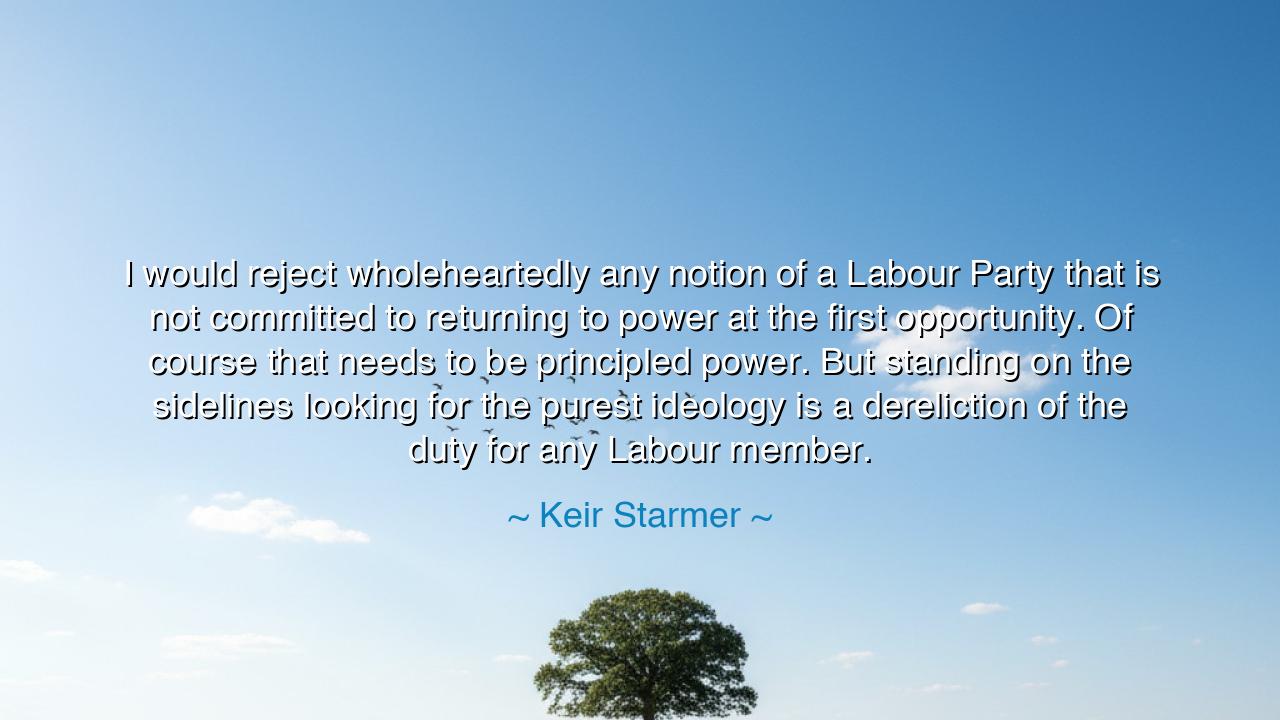
I would reject wholeheartedly any notion of a Labour Party that
I would reject wholeheartedly any notion of a Labour Party that is not committed to returning to power at the first opportunity. Of course that needs to be principled power. But standing on the sidelines looking for the purest ideology is a dereliction of the duty for any Labour member.






In these resolute words, Keir Starmer speaks to the duty of leadership and the responsibility of political engagement. He declares that a Labour Party must be committed to returning to power at the first opportunity, emphasizing that political movements exist not solely to debate ideals, but to effect change in the world. Starmer underscores that power must be pursued with principle, reminding all members that leadership demands both moral clarity and practical action. To abstain or remain on the sidelines in the name of theoretical purity is to abandon the very mission of service.
The origin of this insight lies in the history of political struggle and the lessons of past movements. From the councils of the Roman Republic to the gatherings of revolutionary assemblies in Europe, political actors who deferred action in pursuit of perfect ideology often allowed injustice and oppression to persist. Starmer’s warning echoes the timeless wisdom that principled ambition must be paired with engagement; ideals untested in the crucible of power remain hollow. His exhortation situates modern Labour within this lineage of ethical yet pragmatic leadership.
History provides vivid examples of this principle in action. Consider Franklin D. Roosevelt, whose unwavering commitment to returning to power after electoral defeat in the early 1930s allowed him to implement the New Deal and transform the United States. His principles guided him, yet he never allowed them to become abstract. Roosevelt understood, as Starmer emphasizes, that standing on the sidelines in search of ideological purity is a dereliction of duty when the opportunity to serve and act presents itself.
Starmer’s insistence on principled power also reflects the tension between morality and practicality in governance. True leadership requires both vision and the courage to act, even when compromises must be made. Political actors who refuse to engage until the ideological conditions are perfect risk surrendering influence to forces that care little for justice, equality, or the common good. Starmer reminds members that the pursuit of power is not itself corruption—it is the vessel through which values can be enacted in the world.
Ultimately, this quote is a meditation on responsibility, courage, and pragmatic idealism. Starmer teaches that political commitment is inseparable from action; the mission of a party is not solely to debate or theorize, but to return to power and apply principles for the welfare of the people. Let this wisdom endure for future generations: ideals must be married to action, and leadership demands stepping into the arena of power with both integrity and resolve. To remain passive in the pursuit of purity is to abandon the very cause one claims to uphold.






BVBien Vo
This comment captures a dilemma every political party faces: should it focus on purity or practicality? Starmer argues that sitting out of power to preserve ideological purity is irresponsible, which makes sense strategically. But I wonder if that argument risks alienating members who joined the party for moral conviction rather than political expedience. Is there a balance that truly satisfies both sides?
PTLe Phuoc Tri
I understand what Starmer is saying—politics without power is philosophy. But it also raises an important question: does the pursuit of 'principled power' actually work in practice? Many leaders promise to balance values with electability, yet history shows that once in power, compromises tend to outweigh ideals. How can that cycle be broken?
TTle tuán tú
This quote makes me think about how divided political movements can become over purity versus pragmatism. Starmer’s approach feels like a call to action for real-world impact. But I wonder how that resonates with grassroots members who feel that compromise often betrays their values. Is it possible to govern effectively while still preserving the soul of the movement?
KADo Kim Anh
Starmer’s point highlights the tension between idealism and practicality that all political movements face. He seems to believe that power itself is the vehicle for principle, not its opposite. I’m curious—can a party maintain integrity while pursuing power aggressively, or does the process of winning inevitably dilute its convictions?
TGTrannguyen Giahan
I find this perspective refreshingly realistic, though a bit concerning. On one hand, it acknowledges that political parties exist to enact change, not just debate it. On the other, it risks implying that victory matters more than ideological purity. Isn’t there a danger that in the rush to regain power, a party can lose its core identity or moral compass?